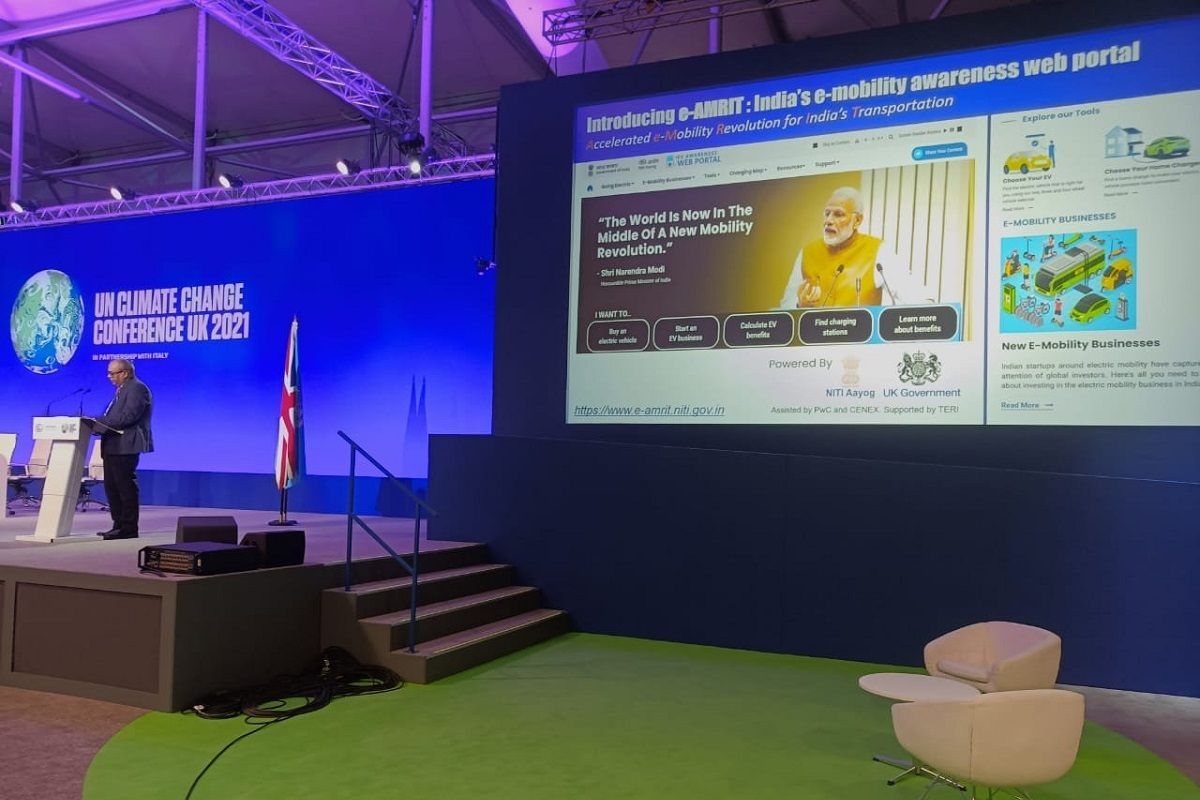
- Category:
- News
UK-India Electric Mobility Accelerator
UK and India have agreed to strengthen their collaboration on clean transport and related infrastructure in their 2030 roadmap.
As part of the COP-26 zero emission vehicles (ZEV) transition, the UK Government is working with stakeholders across India to support activities that can make the transition faster, more affordable, and available to all.
The UK-India Electric Mobility Accelerator Awareness Campaign is part of this programme, funded by the Foreign Commonwealth Office. The main stakeholder of this Cenex project is NITI Aayog, Government of India and it has been delivered by PricewaterhouseCoopers, India, and Cenex, UK.
The UK-India EV Accelerator delivered 3 key outcomes:
The first phase of the UK-India Electric Mobility Awareness Campaign delivered a framework for a national e-mobility awareness web-portal for India, delivered by Cenex in the UK and TERI in India.
This project aimed to launch a web portal at COP-26 in Glasgow to promote the UK and India knowledge share between the national governments of the two countries, and state and regional governments.
PwC rapidly developed the national EV awareness portal with Cenex guiding the design, user requirements analysis, philosophy, objectives and sharing best practices.
The portal was branded ‘e-AMRIT: Accelerated e-Mobility Revolution for India’s Transportation’ and was successfully launched at COP-26 as India’s e-mobility awareness web-portal by the Government of India.
The web-portal serves as a single source of truth for the people of India looking to switch to electric vehicles or invest in the ever-growing e-mobility industry so they can make informed decisions.
It hosts key data like the national EV policy, and the EV and e-mobility policies of the different states in India, in one place.
e-Amrit also provides interactive tools and calculators to help people make informed decisions about their switch to EVs, including a home charging calculator, public charging calculator, CO2 savings and journey cost calculator amongst others.
e-Mobility Knowledge Exchange Partnership
The next part of the project focussed on opening a dialogue with three ‘EV Lighthouse’ cities in India, part of nine who will lead the way with e-mobility in India: Ahmedabad, the capital of Gujarat, Bengaluru, the capital of Karnataka, and Hyderabad, the capital of Telangana, were approached to be beneficiaries of the project.
PwC, India consulted with the state government’s nodal agencies which are tasked with delivering the EV policy and goals of the states, to gather their data, information on their journey through the ZEV transition,
In turn PwC used this information to develop strategic roadmaps for the three Indian cities.
Meanwhile Cenex selected and approached appropriate UK councils to pair them with the three Indian cities for a Knowledge Share Partnerships (KEP) – Coventry city, Birmingham and Transport for London.
Cenex arranged three webinars for the three UK city councils and Indian state governments which took place in March 2022, as follows:
- Coventry-Hyderabad
- London-Bengaluru
- Birmingham-Ahmedabad
The progress made by Coventry on transitioning their bus fleets to electric, Birmingham’s clean air zone and TfL’s ULEV zone, electric taxis and rapid charging hubs programme provided plenty of learnings which were relevant to the roadmaps for the three Indian cities and stimulated lengthy discussions.
The webinars are the start of the Knowledge Exchange Partnership between the three pairs and introduced each other’s journeys to the ZEV transition so far.
They were highly successful and promoted collaboration between UK and India that will continue long after this project.
As part of the NITI Aayog delegation’s trip to Glasgow for COP26, Cenex arranged and hosted a successful UK-India Knowledge Share Roundtable.
The meeting took place at the Arnold Clarke Innovation Centre (ACIC) and was attended by representatives of the Office of Zero Emission Vehicles (OZEV), Transport Scotland, Renewable Energy Association and the Energy Saving Trust.
The ACIC is a non-sales focussed organisation and showroom, showcasing latest technology in electric mobility and related infrastructure; the goal of the organisation is to boost e-mobility awareness without the pressure on consumers to buy anything.
The representatives of NITI Aayog were impressed with such an initiative, and tasked PwC and Cenex to provide a report on UK Innovation Centres.
The report reviews the two different centres in the UK, the ACIC and the Electric Vehicle Experience Centre (EVEC) in Milton Keynes.
It covers the two different operating models, the challenges, and positive impacts of each, thus providing a basis from which to develop a plan for such centres in India.
Final Meeting
The project culminated in a virtual meet with private sector stakeholders in India, NITI Aayog, the three state governments and the British High Commission.
Cenex and PwC moderated a discussion on the progress of the e-mobility awareness campaign between the private sector and state governments.
The private sector feedback and observations have allowed NITI Aayog and the Foreign Commonwealth Office to discuss future steps for the UK-India EV Accelerator Programme.
Sagar Mody, Technical Consultant – Infrastructure Strategy, at Cenex, said: “The UK-India EV Accelerator is one of the most important international projects that Cenex has been part of.
“At this key juncture of our race to limit the adverse effects of climate change and transition to cleaner transport, it is very important for countries to work together.
“This project has shown that the solution to the problem starts with giving power to the people.
“The web and smartphone-based awareness initiatives will ensure that unbiased and true knowledge is available to as many people as possible, at the touch of a button.
“The Knowledge Share Partnerships between the UK and India cities will play a key role in the future as both countries develop strategies for the next few decades and implement them.
“It will enable best practices and learning to be shared bi-laterally with a true spirit of collaboration which, ultimately, is best for the people of both countries.”